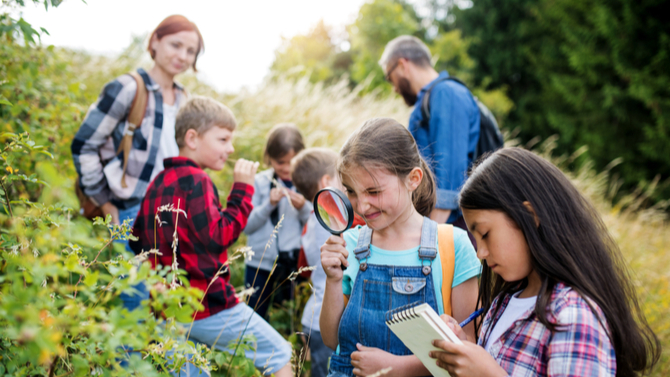Would you believe that among American children, aged 8 to 18, the average time spent in front of screens (television, computers, video games, cell phones, and mobile devices) is seven hours? It’s true, reported by a recent study by the Kaiser Family Foundation. The New York Times was even more blunt, entitling a similar finding “If your Kids are Awake, They’re Probably Online.” And if you’re honest, you’re probably not really surprised. The question is what does it mean for the next generation of kids raised on virtual reality?
Children today are spending far less time outdoors and as a result many wonder if they are suffering from a phenomenon known as nature deficit disorder. The term, created by Richard Louv, in his best-selling book Last Child in the Woods: Saving Our Children from Nature-Deficit Disorder, is used to describe children alienated from a connection to the natural world.
Will these children, always indoors, learn to love nature? Will they want to protect and care for planet earth? Beyond the scope of environmental protection, studies have shown kids who enjoy more time outside aren’t sick nearly as often. They also have better reading comprehension, enhanced focus, and superior concentration. In addition, these outdoor kids have fewer issues with aggression, depression, stress, anxiety, ADHD, and are less likely to be overweight. Other studies have shown children who enjoy outdoor time regularly perform better in school and have better eyesight.
Research also shows today’s environmental giants were influenced most by their childhood experiences in nature. Time spent in nature creates a unique bond, one which brings about a commitment to the protection and preservation of nature in adults. Contact with and play in nature, not only makes children healthier, but happier, creating a love of nature that can last a lifetime.
Making the Changes to Avoid Nature Deficit Disorder
While Nature Deficit Disorder is not a medical term, it does indeed aptly describe what scientists and parents are seeing among children who remain indoors without making a connection to nature. Senses, including attention, are decreased, illnesses are increased, and other deficiencies arise. Research, while correlative, suggests children who are immersed regularly in nature gain confidence, are physically and emotionally healthier, and have a greater ability to calm and focus.
So, how does one make a change and get children outside? Is it simply to be left up to parents and caregivers? Can schools help? What about neighborhoods, communities, and cities, can they make a difference? It is up to everyone to help children connect with nature – parents, caregivers, educators, local leaders, urban planners, government officials – encouraging opportunities for outdoor experiences in every child’s life. The children of today need to have a personal connection with nature, no matter where they live – urban city centers, suburbs, or country.
Adults can encourage nature experiences for children, allowing them to get wet, muddy, and explore all that nature has to offer. Nature inspires the imagination and emboldens children to have confidence in themselves. In outdoor play, children have the opportunity to take “risks” which helps them develop crucial cognitive skills like executive function, a complex process which results in self-control and is often a strong predictor of success.
When children are given opportunities to enjoy nature, they learn to interact and engage with it, building a relationship with the natural world. Adults must lead by example, providing ample opportunities to explore green spaces every day. Designing homes, workplaces, schools, and communities in ways that embrace nature should be the norm, not the exception.
Children and adults, young and old, can be taught love and appreciate nature. It simply takes spending time there on a daily basis. Parents and caregivers can do it, as can educators and schools, and camps across the country, encouraging children to enjoy outdoor time in parks, gardens, and natural play areas.

